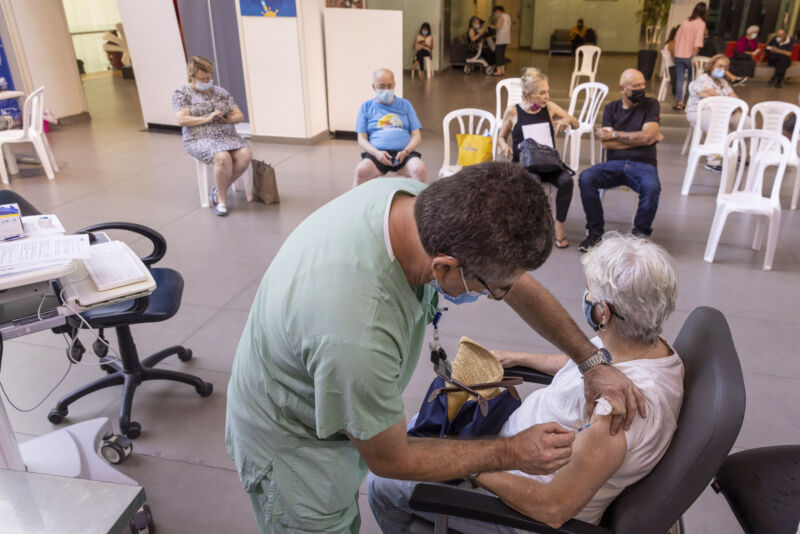

With a second booster now authorized for some, the question is when to get it [U...
source link: https://arstechnica.com/science/2022/03/with-a-second-booster-now-available-to-some-the-question-is-when-to-get-it/
Go to the source link to view the article. You can view the picture content, updated content and better typesetting reading experience. If the link is broken, please click the button below to view the snapshot at that time.

Dose dilemma —
With a second booster now authorized for some, the question is when to get it [Updated]
Experts are torn whether people should get boosted now or wait for signs of a surge.
Beth Mole - 3/29/2022, 8:00 PM

Update 3/29/2022, 4 pm ET: Swiftly following authorization from the Food and Drug Administration earlier Tuesday, the Centers for Disease Control and Prevention announced it is updating its recommendations to allow people ages 50 and up as well as certain immunocompromised people to receive a second booster dose of either the Pfizer/BioNTech or Moderna COVID-19 vaccines.
"Today, CDC expanded eligibility for an additional booster dose for certain individuals who may be at higher risk of severe outcomes from COVID-19," CDC Director Rochelle Walensky said in a statement. "Boosters are safe, and people over the age of 50 can now get an additional booster 4 months after their prior dose to increase their protection further. This is especially important for those 65 and older and those 50 and older with underlying medical conditions that increase their risk for severe disease from COVID-19 as they are the most likely to benefit from receiving an additional booster dose at this time. CDC, in collaboration with FDA and our public health partners, will continue to evaluate the need for additional booster doses for all Americans.”
The agency also announced that adults who received a Johnson & Johnson COVID-19 vaccine and a Johnson & Johnson booster dose more than four months ago are now also eligible to get a second booster dose using an mRNA vaccine (Pfizer/BioNTech or Moderna).
The CDC's decision, like the FDA's authorization, was carried out without convening their respective independent advisory committees to weigh in on expanding the use of boosters. Without input from those committees, the two agencies risk drawing criticism for rushing the review and use of second boosters. In a mid-day press briefing, FDA vaccine regulator Peter Marks explained bypassing the agency's advisory committee by saying that the decision to authorize second boosters was "relatively straightforward."
Original story 3/29/2022, 12:44pm ET: The US Food and Drug Administration on Tuesday announced the authorization of second booster doses of both the Pfizer/BioNTech and Moderna COVID-19 vaccines for people ages 50 and above, as well as certain immunocompromised people.
Advertisement
The FDA's decision, which was made without consulting its panel of independent expert advisers, was expected this week.
“Current evidence suggests some waning of protection over time against serious outcomes from COVID-19 in older and immunocompromised individuals," Peter Marks, the FDA's top vaccine regulator, said in a statement. "Based on an analysis of emerging data, a second booster dose of either the Pfizer-BioNTech or Moderna COVID-19 vaccine could help increase protection levels for these higher-risk individuals."
Specifically, under the emergency authorization, people ages 50 and above can get a second booster of either the Pfizer/BioNTech or the Moderna vaccine if they are four or more months out from their first booster. For certain immunocompromised people who are four months out from their first booster, a second Pfizer/BioNTech booster is available to those ages 12 and up, and a second Moderna booster is available to those ages 18 and up. The categories of immunocompromised people eligible for a second booster include those who have undergone solid organ transplant and those with equivalent levels of immunodeficiency.
There is sparse data on the effectiveness and durability of a second booster against omicron, the reigning globally dominant variant. Most of the data evaluated is from Israeli researchers, who have published three studies to date. In one study carried out using medical records from over 1.1 million people ages 60 and above, those with a second booster (aka a fourth dose in non-immunocompromised people) were two times less likely to be infected and around four times less likely to have severe COVID-19 compared with people who had only three shots.
In a much smaller study looking at 1,050 younger, healthy health care workers, researchers found that a fourth dose boosted antibody levels, but effectiveness against symptomatic infection with omicron was low—43 percent for Pfizer and 31 percent for Moderna. Though the study is small and the confidence intervals for those estimates wide, the authors concluded that "a fourth vaccination of healthy young health care workers may have only marginal benefits. Older and vulnerable populations were not assessed."
In a third study involving over 560,000 people ages 60 and above, a second booster reduced the risk of death from COVID-19 by 78 percent compared with those who had only received their first booster four months ago.
Page:
Recommend
About Joyk
Aggregate valuable and interesting links.
Joyk means Joy of geeK